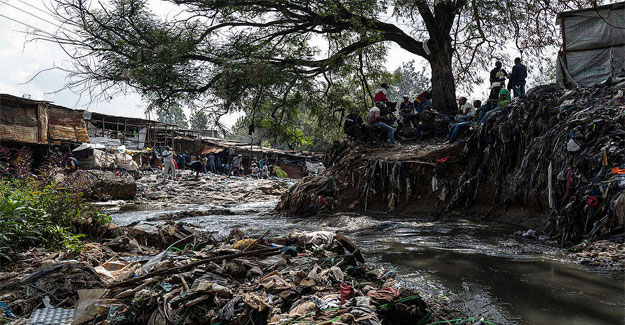
Textiles Waste Disguised As Second-Hand Clothes Exported To East Africa: Greenpeace
Fast fashion brands are promoting circularity, but reality shows that this is still a myth. Nowhere is the failure of the fast fashion linear business model more visible than in the countries where many of these cheap clothes end up once their short lives are over: on huge dump sites, burnt on open fires, along riverbeds and washed out into the sea, with severe consequences for people and the planet. Greenpeace International studied the problem of imported textile waste in Kenya and Tanzania. When people donate their used clothes to a charity, bring them to a take-back box at a brand’s store, or to a municipal recycling station, they might assume that they will be sold for a good cause at a charity thrift store, or will be recycled into new clothes. The reality is, that only a small amount (about 10-30%) is actually resold in the country where the clothes were collected. Some are downcycled into lower grade products like rags, and more than half of them are exported for “reuse”, mostly to East and West Africa and Eastern Europe. A closer look Kenya and Tanzania are two of the top five global net importers of these used clothing, called Mitumba, meaning bale or bundle. Vendors at Gikomba market, in Nairobi, said that these days they are often disappointed when they open the bales, because nearly half of the clothes are unusable and have no market value: their quality is too poor, or they are broken or soiled and are nothing more than textile waste. And they are thus left to deal with the textile waste problem and the consequences of fast fashion of the Global North, without the requisite infrastructure. The path from the Gikomba market to the Nairobi River, is literally littered with textile waste piling up along the river banks, falling into the water and flowing downstream. Or these piles of unusable textiles and shoes are burnt on open fires, creating pollution and health problems in the area. In 2019 Kenya imported 185,000 tonnes of second-hand clothes and with about 30-40% of Mitumba having no market value, this means that 55,500 – 74,000 tonnes was actually textile waste. Every day about 150 to 200 tonnes of textile waste – between 60 to 75 truckloads – ends up dumped, burnt, or sent to overflowing dump sites like Dandora. What we’re saying about it The fast fashion trend has turned clothes into throwaway items like disposable packaging. To stop the flow of textile waste being dumped on the Global South, there is no way around massively slowing down fast fashion. Global fashion brands need to completely change their linear business models and start producing fewer clothes that are designed to be better quality, longer lasting, repairable and reusable. In addition, there needs to be a shift away from the neocolonial attitudes of Global North countries towards those in the Global South, which impose trading practices mainly beneficial for the Global North. This effectively turns Global South countries into dumping grounds for fast fashion waste, while doing little or nothing to support or develop the clean manufacturing of local textiles and garment production that is needed in these countries, using the same high standards and best practices that are required in Europe. What needs to happen These shocking pictures of massive amounts of textile waste polluting the environment clearly reveal that it’s not enough for global fashion brands to only focus on cleaning up their supply chains. Greenpeace is urging them to step up their efforts to stop the huge end-of-life impacts of their products. Recently the new EU textile strategy was released, which includes some important steps, such as a plan to ban the export of textile waste and promote long lasting, durable and repairable clothing. This is a good start, but to effectively stop the ever increasing devastating effects of fast fashion on people and the environment, regulation of the fashion industry needs to be established internationally through a global treaty.
Textile Excellence
If you wish to Subscribe to Textile Excellence Print Edition, kindly fill in the below form and we shall get back to you with details.












